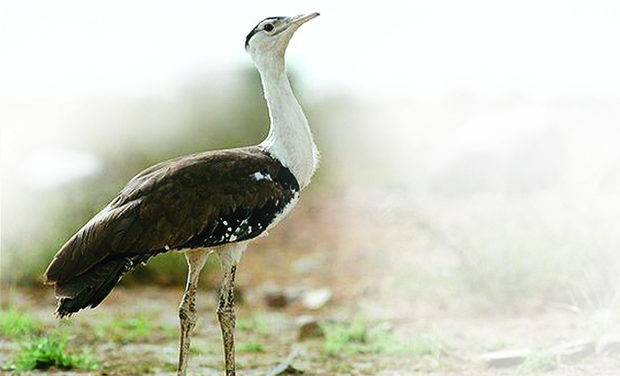The last sighting of a Great Indian Bustard in Andhra Pradesh was outside of the Rollapadu wildlife sanctuary in Kurnool district
The Great Indian Bustard (GIB), a critically endangered bird, whose future appears increasingly bleak even in its ‘stronghold’ in the Desert National Park in Rajasthan, is feared to have disappeared for good from Andhra Pradesh where the bird was living on an extended lease of life, a report in the Deccan Chronicle, says.
The last sighting of a Great Indian Bustard in Andhra Pradesh was outside the Rollapadu wildlife sanctuary, a small patch of about 10 sq km, in Kurnool district.
In the last three years, there has only been sporadic sighting of the bustard in and around Rollapadu.
“This year, there has been no sighting of the bird,” Alan Chong, the wildlife DFO for Atmakur, told Deccan Chronicle.
Even the last time it was seen near Rollapadu was in agricultural fields outside the sanctuary. It barely takes five minutes for it to fly across the sanctuary that extends just about 4 km in a straight line from side to side, from all its four directions.
While officials hope that the solitary bird, believed to be a female, flew west to Siruguppa taluk in Karnataka where another tiny population of two or three bustards is believed to be present, there is no confirmation of such movements.
Sources said that it is feared that the last remaining bustards are all females with hardly any scope for them to breed, and it was just a matter of time before even the one or two birds seen in Siruguppa, disappear, ending GIB’s presence in south India.
The Rollapadu-Siruguppa belt represents the southernmost limit of the distribution of the bustard and with no bird sighted in a year, the Rollapadu Wildlife Sanctuary set up for its protection, could well have lost its flagship species.
According to N. Manjunath, range forest officer at Siruguppa in Karnataka, the last time the Great Indian Bustard was seen was on March 15 this year.
“We think there are one or two birds, but we have not managed to get close, as they just fly away,” he said.
He also said they were not sure if the two birds were a breeding pair or not.
Manjunath said they have acquired 101 acres of land in four different patches across four villages in the taluk for providing undisturbed areas for birds.
*****************************************************************
Readers
These are extraordinary times. All of us have to rely on high-impact, trustworthy journalism. And this is especially true of the Indian Diaspora. Members of the Indian community overseas cannot be fed with inaccurate news.
Pravasi Samwad is a venture that has no shareholders. It is the result of an impassioned initiative of a handful of Indian journalists spread around the world. We have taken the small step forward with the pledge to provide news with accuracy, free from political and commercial influence. Our aim is to keep you, our readers, informed about developments at ‘home’ and across the world that affect you.
Please help us to keep our journalism independent and free.
In these difficult times, to run a news website requires finances. While every contribution, big or small, will makes a difference, we request our readers to put us in touch with advertisers worldwide. It will be a great help.
For more information: pravasisamwad00@gmail.com








